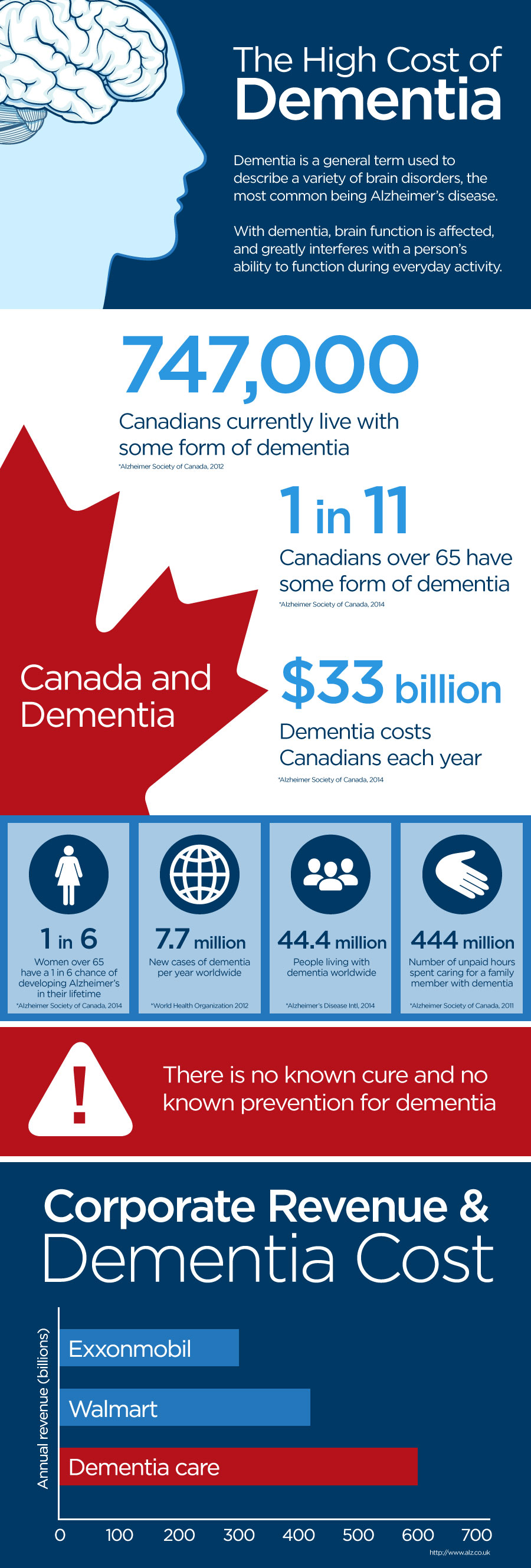WATCH ABOVE: Global National anchor, Dawna Friesen, opens up about her family and its battle with dementia in a special presentation for 16×9.

TORONTO — With more than 30 years of working as a registered nurse, Barbara Crawford frequently saw the quick decline dementia patients faced.
The now 66-year-old retired nurse from Owen Sound, Ont. knew something was wrong years before she was diagnosed herself with vascular dementia in 2012.
READ MORE: Inside the world of dementia, as a painful reality sets in
It started with having trouble remembering things: her house keys or daily tasks at work and around the home. But then it became scary — losing her bearings and where she was going while driving in her car or paying up at the grocery store and forgetting what different dollar bills looked like.
“It’s panic — the first thing you feel is panic, especially being lost. It just leaves you kind of stunned, it’s scary,” Crawford explained.
How many Canadians have dementia?
According to the Alzheimer Society of Canada, some 747,000 people are living with Alzheimer’s disease and other dementias – the number is projected to rise to 1.4 million by 2031.
Seventy-four per cent of us know someone with dementia, the organization says.
READ MORE: Half of Canadians with dementia wait too long for diagnosis, Alzheimer Society warns
If dementia care were a country, it would be the world’s 18th largest economy, ranking between Turkey and Indonesia, according to Alzheimer Disease International.
The annual cost of dementia will increase from $33 billion today, to $293 billion by 2040.
Alzheimer’s disease is the leading form of dementia, accounting for over two-thirds of all dementia cases in Canada today.
READ MORE: Blog – Dealing with dementia in your family
Changes in the brain that lead to dementia can begin up to 25 years before symptoms begin, the Canadian group says. Women account for about 72 per cent of the country’s cases of Alzheimer’s.
Age remains the biggest factor for dementia; the risk doubles every five years after 65.
The causes of dementia are not fully understood and there’s still no cure. That’s why health officials urge patients and family members to look out for signs of the onset of the disease.
READ MORE: ‘Woefully unprepared’ for world dementia epidemic, report warns
What are the symptoms and warning signs of dementia?
As many as 50 per cent of Canadians with dementia are not diagnosed early enough, losing valuable time when intervention can help these people with managing their daily lives.
READ MORE: Alzheimer’s most costly malady in US topping cancer, heart disease
The Alzheimer Society documents a list of 10 signs to watch for:
- Memory loss affecting day-to-day abilities – forgetting things often or struggling to retain new information.
- Difficulty performing familiar tasks – forgetting how to do something you’ve been doing your whole life, such as preparing a meal or getting dressed.
- Problems with language – forgetting words or substituting words that don’t fit the context.
- Disorientation in time and space – not knowing what day of the week it is or getting lost in a familiar place.
- Impaired judgment – not recognizing a medical problem that needs attention or wearing light clothing on a cold day.
- Problems with abstract thinking – not understanding what numbers signify on a calculator, for example, or how they’re used.
- Misplacing things – putting things in strange places, like an iron in the freezer or a wristwatch in the sugar bowl.
- Changes in mood and behaviour– exhibiting severe mood swings from being easy-going to quick-tempered.
- Changes in personality – behaving out of character such as feeling paranoid or threatened.
- Loss of initiative – losing interest in friends, family and favourite activities.
READ MORE: As dementia sets in, artists still recall drawing from memory
Why get diagnosed early?
“Early diagnosis helps the person and family member plan for the future. They can have a discussion with their physician and they know what they may expect and plan more effectively,” Mimi Lowi-Young, CEO of the society, told Global News.
The problem is that dementia is still marred by stigma, she said. There’s fear of the disease, patients may be hesitant to disclose loss of judgement or bouts of forgetfulness and doctors may not be looking for the signs.
Early diagnosis would help patients get the support they need, through keeping them socially and physically active and with medical intervention.
For Crawford, the diagnosis gave her “peace of mind” that something was legitimately wrong. She was offered medication to help with her memory, she joined with others facing dementia and she sought the advice of the Alzheimer Society.
And even with her diagnosis, Crawford has her autonomy — while her daughter lives close by, she lives on her own and found solutions for day-to-day issues that once plagued her.
“To me it’s everything,” Crawford says of being self-sufficient.
She keeps a hook by the door to hang onto her house keys, she knows to log future appointments and other meetings in a daily planner and she labels her stove for safe cooking. She also wears a necklace around her neck in case of falls or any other accidents.
– With files from Francesca Fionda
carmen.chai@globalnews.ca
Follow @Carmen_Chai




Comments